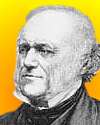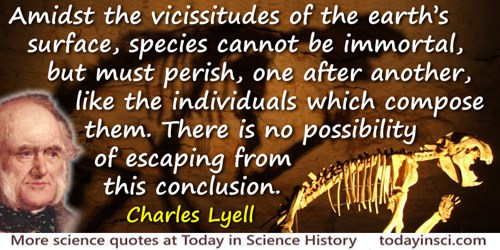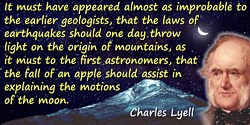 (source)
(source)
|
Sir Charles Lyell
(14 Nov 1797 - 22 Feb 1875)
Scottish geologist who promoted concepts of gradualism to replace the prevailing ideas of catastrophism. Lyell maintained that the Earth's features were, in fact, produced by continuing, gradual effects of natural forces.
|
Sir Charles Lyell Quotes on Species (6 quotes)
>> Click for 34 Science Quotes by Sir Charles Lyell
>> Click for Sir Charles Lyell Quotes on | Geology | Science |
>> Click for 34 Science Quotes by Sir Charles Lyell
>> Click for Sir Charles Lyell Quotes on | Geology | Science |
Amidst the vicissitudes of the earth’s surface, species cannot be immortal, but must perish, one after another, like the individuals which compose them. There is no possibility of escaping from this conclusion.
— Sir Charles Lyell
Principles of Geology (1837), Vol. 2, 202.
As geologists, we learn that it is not only the present condition of the globe that has been suited to the accommodation of myriads of living creatures, but that many former states also have been equally adapted to the organization and habits of prior races of beings. The disposition of the seas, continents, and islands, and the climates have varied; so it appears that the species have been changed, and yet they have all been so modelled, on types analogous to those of existing plants and animals, as to indicate throughout a perfect harmony of design and unity of purpose. To assume that the evidence of the beginning or end of so vast a scheme lies within the reach of our philosophical inquiries, or even of our speculations, appears to us inconsistent with a just estimate of the relations which subsist between the finite powers of man and the attributes of an Infinite and Eternal Being.
— Sir Charles Lyell
Concluding remark, Principles of Geology(1833), Vol. 3, 384-5.
Each species may have had its origin in a single pair, or individual, where an individual was sufficient, and species may have been created in succession at such times and in such places as to enable them to multiply and endure for an appointed period, and occupy an appointed space on the globe.
— Sir Charles Lyell
Principles of Geology(1830-3), Vol. 2, 124.
Probably there was a beginning—it is a metaphysical question, worthy a theologian—species have begun and ended—but the analogy is faint and distant.
— Sir Charles Lyell
Letter to [George] Poulett Scrape (14 Jun 1830). Quoted in Mrs Lyell (ed.), Life, Letters and Journals of Sir Charles Lyell, Bart (1881), Vol. 1, 269.
The ordinary naturalist is not sufficiently aware that when dogmatizing on what species are, he is grappling with the whole question of the organic world & its connection with the time past & with Man; that it involves the question of Man & his relation to the brutes, of instinct, intelligence & reason, of Creation, transmutation & progressive improvement or development. Each set of geological questions & of ethnological & zool. & botan. are parts of the great problem which is always assuming a new aspect.
— Sir Charles Lyell
Leonard G. Wilson (ed.), Sir Charles Lyell's Scientific Journals on the Species Question (1970), 164.
The question now at issue, whether the living species are connected with the extinct by a common bond of descent, will best be cleared up by devoting ourselves to the study of the actual state of the living world, and to those monuments of the past in which the relics of the animate creation of former ages are best preserved and least mutilated by the hand of time.
— Sir Charles Lyell
The Antiquity of Man (1863), 470.
See also:
- 14 Nov - short biography, births, deaths and events on date of Lyell's birth.
- Principles of Geology, by Charles Lyell. - book suggestion.
- Booklist for Charles Lyell.




 In science it often happens that scientists say, 'You know that's a really good argument; my position is mistaken,' and then they would actually change their minds and you never hear that old view from them again. They really do it. It doesn't happen as often as it should, because scientists are human and change is sometimes painful. But it happens every day. I cannot recall the last time something like that happened in politics or religion.
(1987) --
In science it often happens that scientists say, 'You know that's a really good argument; my position is mistaken,' and then they would actually change their minds and you never hear that old view from them again. They really do it. It doesn't happen as often as it should, because scientists are human and change is sometimes painful. But it happens every day. I cannot recall the last time something like that happened in politics or religion.
(1987) -- 


